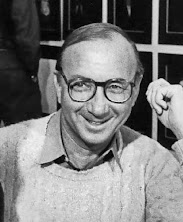1. In a 1979 interview in Playboy, Neil Simon noted: "There are two million interesting people in New York and only seventy-eight in Los Angeles."
2. Simon and Stephen Sondheim once considered collaborating on a musical version of The Front Page. Simon wrote in his memoir The Play Goes On: "The one thing you look for in a musical is why people actually sing songs, a piece of advice that Stephen Sondheim had given me years earlier when I suggested that he and I do a musical version of The Front Page...'(It's) a great play, said Stephen, but why do they sing?' I looked him right in the eye and said, 'I haven't the slightest idea--except that you write such incredible songs.' 'Not without good reason,' said Stephen wisely, and instead of writing with him, I decided to enjoy just listening to everything he wrote without me getting in his way."
3. One of Neil Simon's least successful plays was The Gingerbread Lady (1970), which starred Maureen Stapleton as an alcoholic actress. Although Stapleton won a Tony for Best Actress, the play's original run was just over five months. Ten years later, Simon adapted it for the screen as Only When I Laugh, which earned Oscar nominations for his then-wife Marsha Mason (Best Actress), James Coco (Best Supporting Actor), and Joan Hackett (Best Supporting Actress).
4. Of his first play Come Blow Your Horn, Simon recalled: "(It) took the equivalent of the combined hours, months, and years I put in writing The Red Buttons Show, the Sgt. Bilko Show, Caesar's Hour, and finally The Garry Moore Show, a weekly variety program on CBS which featured a bright new and dazzingly funny comedienne, Carol Burnett. I would come in at eight o'clock in the morning and work on my play for two hours, typing on Garry Moore's stationery, before tackling the Carol Burnett sketches at ten o'clock. Not only was Garry unknowingly subsidizing me while I worked for him, but he eventually became one of the first investors in Come Blow Your Horn, so he eventually got the money back for the typing paper I "borrowed" from him, and then some."
5. Neil Simon was married five times. He met his first wife, Joan Baim, when she was a children's counselor at a Poconos resort; Simon and his brother contributed to weekly revue shows at the same resort. Joan died in 1973 following a long battle with cancer. Simon met his second wife, actress Marsha Mason, when she auditioned for his play The Good Doctor in 1973. They divorced ten years later, but remained friends. His third and fourth marriages were to actress-model Diane Lander, who was 24 years younger than him. Knowing Simon's propensity to write about his own life, one of the conditions of their pre-nuptial agreement was that Neil not write about her or her daughter during her lifetime. Neil married Elaine Joyce in 1999; they were together until his recent death.
6. Simon's brother Danny, who was eight years older, brought Neil (whose nickname was Doc) into show business. Danny also inspired one of Neil's most successful plays when he divorced his wife and moved into an apartment with another divorced man. Recognize the premise of The Odd Couple?
7. Neil Simon has won three Tony Awards, a Pulitzer Prize (Lost in Yonkers), and the Kennedy Center's Mark Twain Prize for American Humor. He earned four Oscar nominations for Best Writing (The Odd Couple, The Sunshine Boys, The Goodbye Girl, and California Suite. He also received four Emmy nominations (two for Caesar's Hour and one each for TV adaptations of Broadway Bound and Laughter on the 23rd Floor).
This post is part of The Neil Simon Blogathon hosted by Caftan Woman and Wide Screen World.











